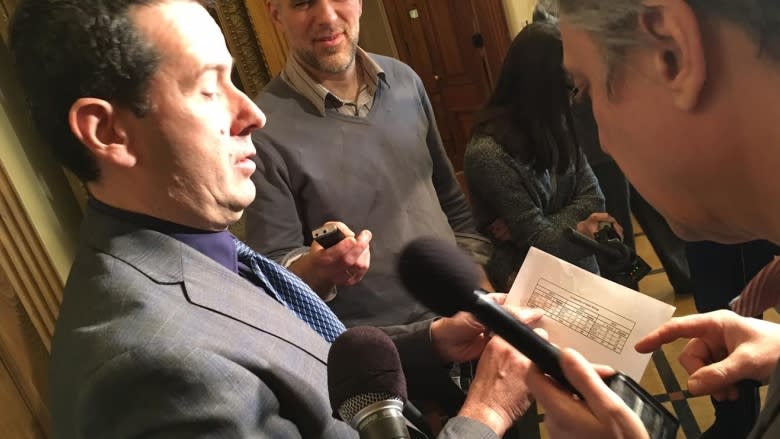'It's pretty sparse': David Coon wants to strengthen MLA conflict law
Green Party Leader David Coon says he'll try to strengthen the conflict-of-interest law that applies to MLAs and cabinet ministers, but he doesn't expect to get very far.
Coon says the case of Health Minister Victor Boudreau has exposed weaknesses in the current law, but predicts the Liberals will defeat his attempts to amend legislation updating the statute.
Boudreau has recused himself from dealing with the issue of fecal contamination of Parlee Beach because he's an investor in a proposed campground there, and one government move could be a moratorium on development at the beach.
But both Boudreau and the province's conflict of interest commissioner say there's no actual conflict because the law says MLAs aren't furthering their private interests when their decisions are "of general public application" or affect "a person as one of a broad class of persons."
In other words, Boudreau's decisions on Parlee Beach wouldn't be a conflict because, while they could affect his investment, they'd also affect many other people or businesses.
"It doesn't make any sense to me," Coon said Wednesday. "I don't think that was the intent of the legislation."
But, he added, "on reading it, it's pretty sparse and one can see how that interpretation could be made. So I think it's quite appropriate to amend it, to give it more precision, to give clear direction to the conflict of interest commissioner through that legislation."
Bill before legislature
The Liberals have a bill before the legislature now to update the Members' Conflict of Interest Act, but it doesn't make the change Coon wants.
Coon acknowledged that his amendment will probably be doomed because the Liberal majority in the legislature has refused to vote for any amendments he moves on any legislation.
Environment Minister Serge Rousselle said the existing conflict law is already strong enough because it includes blind-trust provisions, which he calls "the strongest thing you can do."
Democracy Watch, an Ottawa ethics watchdog, has called the "general public application" exemption "a huge loophole" that should be closed.
The group also said the law needs to be rewritten to get rid of a provision that allows Boudreau to keep the names of his fellow investors secret.
The law says cabinet ministers involved in "a business activity" must list other investors who own more than 10 per cent of the operation.
Blind-trust provision
Conflict of Interest Commissioner Alexandre Deschênes told CBC News in a written statement that based on how the law is structured, a minister who puts an investment in a blind trust is no longer involved in the business and is exempt from having to list the other investors.
Rousselle said he did not want to "go against" Deschênes's interpretation.
"You have here a decision of a former judge of the Court of Appeal of New Brunswick, someone who has been a judge for more than 30 years, so I can assure you that I trust his judgment," Rousselle said.
Amendments to the law wouldn't challenge Deschênes's decision, however. They would change the law that his decision is based on.
But Rousselle said the blind trust provisions are enough.
"There is a blind trust and that is the way to do it to make sure there is not a conflict of interest."
PCs look to committee
Progressive Conservative Opposition Leader Blaine Higgs wouldn't rule out amendments on the two provisions questioned by Democracy Watch, but he said given the Liberals would defeat them, he wants to raise the matter at the legislative administration committee.
The all-party committee oversees the legislature and could study the issue by bringing in "subject matter experts," Higgs said.
"If we want to get to the bottom of it, that's the way to do it."
Rousselle tried to deflect attention from PC attacks on Boudreau on Wednesday by releasing numbers showing that there were problems with water quality tests at Parlee Beach in 2014 and 2015 as well. The PCs were still in government in 2014.
Parlee problems in 2014-15, too
The table he gave to journalists said water quality was rated "good" on 50 days in 2014 when it should not have been rated good at all. There were four "fair" days when there should have been 14, and 20 "poor" days when there should have been 62.
But Rousselle wasn't able to explain how or why the numbers were wrong.
"That's one of the reasons I was not at ease using these numbers, but I think I have to give it to you," he said.
The 2016 numbers were wrong because test results were averaged together rather than based on the worst rating, but Rousselle said he didn't know if that was the problem in 2014.
"I cannot answer that question. What I'm telling you is what was posted was this, and what should have been posted is this."



